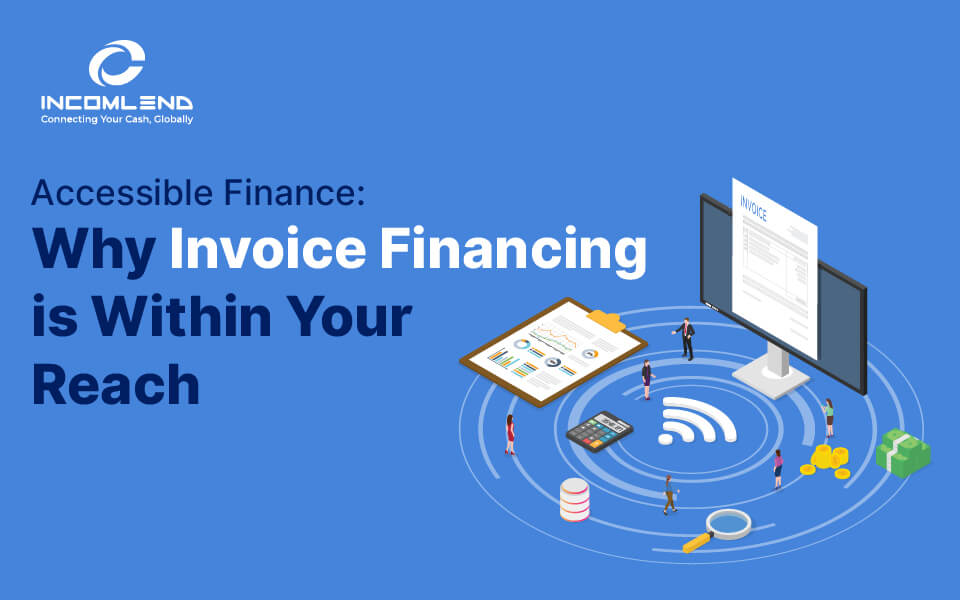Accessible Finance: Why Invoice Financing is Within Your Reach
February 7, 2023
At US$1.7 trillion, the finance gap is astounding. Businesses are simply not getting the capital they need to sustain and grow their businesses. Part of the reason for this shortfall is where they are trying to access their capital.
Because banks are the financial institutions around which most businesses are built, enterprises in need of funds most often seek bank loans. These are notoriously inaccessible for a variety of different reasons. The first is the requirements themselves. Banks, because they operate in a highly regulated industry, will demand prospective borrowers furnish a litany of requirements, including everything from extensive financial information to trade references.
These requirements are couched into a process full of red tape. Businesses not only need to submit these requirements, but they have to go through multiple back-and-forth sessions with the bank. There is, in short, plenty of red tapes. This would all be fine if most businesses walked away with capital from the bureaucracy, but such is not the case. The businesses who are turned down for a bank loan will have just wasted time that they could have better spent on seeking more accessible financing or growing their business. This problem is compounded by the fact that there may be macroeconomic forces, such as a surge in COVID-19, that makes working capital even more important.
Because bank loans can be difficult to get, many business leaders assume that this holds true for all forms of financing. But such is not the case. Invoice financing, for example, can be more accessible than bank loans by leaps and bounds. At Incomlend, we make it a point to extend financial inclusion to more businesses in need of capital. Central to this mission is market education: Since many people have misconceptions about financing in general and invoice financing in particular, it is our role to provide them with advice. To this end, we want to show that invoice financing is more accessible than they may think. Invoice financing, in other words, is well within their reach, should they prepare the proper requirements.
Collateral-free financing
Unlike banks, which usually require some form of collateral, invoice financing is a form of collateral-free financing. In other words, no form of collateral is required by either trade partner. Our solution doesn’t require collateral, and goes off-the-balance-sheet because it doesn’t figure as a loan. Invoice financing is thus ideal for companies that do not want to over-leverage themselves with debt.
Geographic Eligibility
We are happy to work with businesses in certain markets around the world. These are some of the supplier countries we cover:
-
- Singapore
- Hong Kong
- China
- India
- Bangladesh
- Pakistan
- Vietnam
- Malaysia
- Indonesia
- United Arab Emirates
- Latin America
While we are especially eager to work with businesses headquartered from these countries, or who have a trade partner operating from one of them, we also work with other markets.
Trade History
To obtain invoice financing on a particular receivable, the trade partner cannot be new. In other words, the importer or exporter must have an existing trade history with this partner that pre-dates the receivable that they wish to factor in. There is a minimum of one year of doing business with one another, which provides a clear track record that makes it easy to render a decision on the organization’s eligibility for invoice financing.
Goods
Incomlend is industry-agnostic, save for perishable goods, dangerous goods, and coal. We work with businesses across a whole range of industries, including everything from apparel to healthcare. As such, we welcome applications from a variety of industries. On our eligibility form, businesses can identify as being in apparel, automotive, construction, chemicals, electronics, healthcare, manufacturing, metals, packaging, or fast-moving consumer goods. If the business does not fit into any of those categories, it can simply list “other.”
By being industry-agnostic, we have a greater chance of helping all the businesses in the supply chain in need of working capital.
Revenue
Many bank loans are accessible to only the largest of businesses. At Incomlend, there is a broader range of businesses to that we can provide invoice factoring – again because we want our services to be as inclusive as possible. To this end, our eligibility form has several tiers of revenue that businesses can classify themselves into, and we make case-by-case decisions for both importers and exporters.
Upon submitting the information above on our eligibility form, importers and exporters should hear from our team soon, who will provide a decision based on the information submitted.
Importers and exporters who are approved for Incomlend enjoy a user-centric experience as it comes to actually obtaining the working capital they need. Upon approval, these businesses can proceed to Incomlend, submit the export receivable that they wish factored, and then get their money within 48 hours. If they are an exporter, it will be their export receivable that is paid. If they are an importer, it will be the export receivable of their trade partner that is paid, and then the importer gains up to 90 or 120 days to pay the value back, depending on the terms.
As can be seen from the requirements and process listed above, invoice financing is very accessible for importers and exporters in the supply chain. Businesses would be wise to try this form of financing to obtain the working capital they need, so they can grow exponentially.
Enquire now about our financing solutions: book a free discovery call with our experts.
